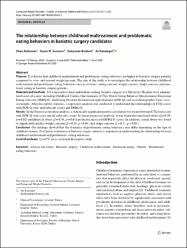The relationship between childhood maltreatment and problematic eating behaviors in bariatric surgery candidates
Özet
Purpose It is known that childhood maltreatment and problematic eating behaviors are higher in bariatric surgery patients
compared to over- and normal-weight persons. The aim of the study is to investigate the relationship between childhood
maltreatment and problematic eating behaviors such as restraint, eating concern, weight concern, shape concern, and emotional eating in bariatric surgery patients.
Materials and methods 112 consecutive obese individuals seeking bariatric surgery at a University Hospital were administered asset of scales, including Childhood Trauma Questionnaire (CTQ), Dutch Eating Behavior Questionnaire-Emotional
Eating subscale (DEBQ-E), and Eating Disorder Examination-Questionnaire (EDE-Q) and sociodemographic form, crosssectionally. After descriptive statistics, a regression analysis was conducted to understand the relationships of CTQ scores
with EDE-Q total, and subscale scores and DEBQ-E.
Results In the Pearson correlation analysis, a statistically signifcant positive correlation was found between CTQ total score
with EDE-Q total score and all subscales scores. In linear regression analyses, it was found that emotional abuse (β=0.39,
p=0.02) and physical abuse (β=0.36, p=0.01) predicted increased DEBQ-E scores. In addition, sexual abuse was found
to signifcantly predict weight concern (β=0.26, p=0.04) and shape concern (β=0.31, p=0.01).
Conclusion Our fndings showed that the dynamics of problematic eating behaviors may difer depending on the type of
childhood trauma. Psychiatric evaluation of bariatric surgery patients is important in understanding the relationship between
childhood maltreatment and problematic eating behaviors.
Level of evidence Level V, cross-sectional descriptive study.
Cilt
26Sayı
5Bağlantı
https://hdl.handle.net/11363/5497Koleksiyonlar
Aşağıdaki lisans dosyası bu öğe ile ilişkilidir:


















